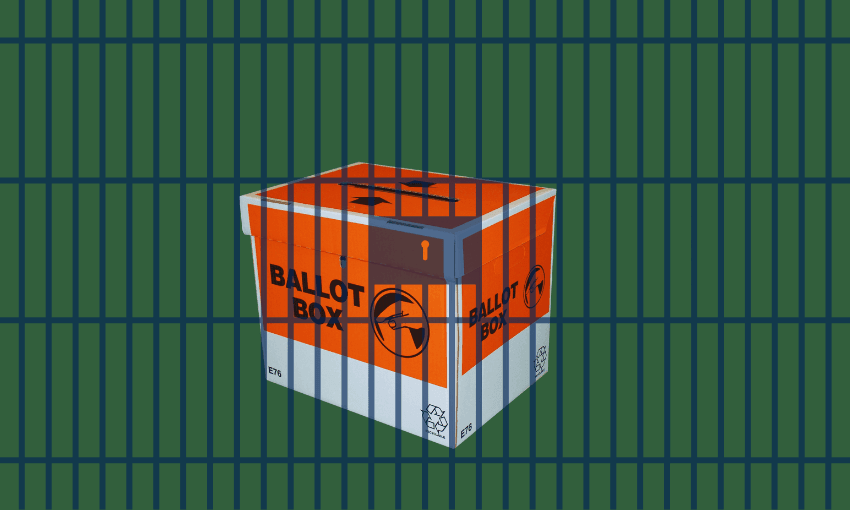It is an unjustifiable limit on the electoral rights of New Zealand citizens that will disproportionately harm Māori, writes law lecturer Carwyn Jones.
The government has announced that it intends to resurrect the ill-conceived, Bill of Rights-breaching blanket ban on prisoner voting.
This policy was previously implemented by a law passed in 2010 that extended the voting ban from prisoners serving sentences of longer than three years to all those in prison, no matter how serious their crime or how long their sentence. At the time, the attorney-general’s report to parliament on the law noted that disqualifying all prisoners from voting in this way was inconsistent with the electoral rights protected by the New Zealand Bill of Rights Act and that breach of rights could not be justified.
The courts subsequently confirmed this, with the High Court issuing a formal declaration that the law was inconsistent with the Bill of Rights Act. In 2020, parliament responded by enacting legislation to reinstate the pre-2010 approach, under which people serving sentences of less than three years are entitled to register to vote. That has remained the position since then, despite a recommendation from the Independent Electoral Review Panel in 2024 that all prisoners should have the right to vote.
As with many of this government’s evidence-free and vibes-based policies, the blanket ban on prisoner voting will disproportionately harm Māori. The previous version of this policy was the subject of an urgent Waitangi Tribunal inquiry. That inquiry, led by Māori Land Court judge and former Crown prosecutor Pat Savage, resulted in one of the most scathing Waitangi Tribunal reports in recent years. In He Aha i Pērā Ai? The Māori Prisoners’ Voting Report, the tribunal found, as a matter of fact, that Māori had been disproportionately affected by the blanket ban.
The well-traversed, underlying issues of over-policing, overcharging and over-convicting of Māori have led to an overrepresentation of Māori in prison. That overrepresentation, combined with the fact that a higher proportion of Māori are imprisoned for lower-end offending, meant that the disproportionate effects of disqualifying people serving sentences of under three years was particularly severe. The graph below shows the numbers of Māori and non-Māori (relative to population) removed from the electoral roll following a sentence of imprisonment between 2004 and 2018. The consequence of the 2010 blanket ban is stark and shocking.
The tribunal also found that the harmful impacts on Māori extended beyond an individual and their time in prison. People coming out of prison face significant practical barriers to re-enrolling on the electoral roll. Research shows that if a young person does not vote in the first election that they are able to, they are less likely to vote in subsequent elections. A blanket ban on prisoner voting, therefore, has long-term implications for the development of positive voting habits. Young Maōri are more likely to be imprisoned than non-Māori, again exacerbating the harm of this policy. The Tribunal found that the law was operating as a de facto permanent disqualification from voting.
Furthermore, evidence also shows this policy has a “ripple effect” on voting behaviour. Disenfranchising Māori prisoners affects their whānau and wider communities too. As one of the claimants in the Waitangi Tribunal inquiry put it: “Taking away Māori prisoners’ right to vote affects all Māori. Individuals cast votes, but it’s communities which elect governments. Māori prisoners have usually been subjected to the worst effects of Crown policies; a lot of them have been in state care as youths, and many of them were let down by state agencies during their lives. Leaving them out of the political conversation not only disempowers them individually but also affects our iwi as well as Māori generally.”
The tribunal took the view that the prisoner voting ban was inconsistent with the rehabilitative objectives of the corrections system because it encouraged exclusion from communities and social institutions, rather than inclusion, participation and reintegration.
Courts in other jurisdictions and the United Nations have also recognised blanket bans on prisoner voting as a breach of human rights. Such a policy would go against New Zealand’s obligations under the International Covenant on Civil and Political Rights (ICCPR). The United Nations Human Rights Committee considers blanket prisoner voting bans as inconsistent with the ICCPR and as serving no rehabilitative purpose. It has noted the “significant racial implications” of prisoner voting prohibitions, given the disproportionate representation of ethnic minorities in most prison populations.
A blanket ban on prisoner voting is a retrograde and harmful policy. It deliberately persecutes Māori individuals and communities. It is an unjustifiable limit on the electoral rights of New Zealand citizens that shows this government’s contempt for the courts, the rule of law, internationally recognised human rights standards, and evidence-based policy. In other words, it is exactly what we have come to expect from the coalition government.




